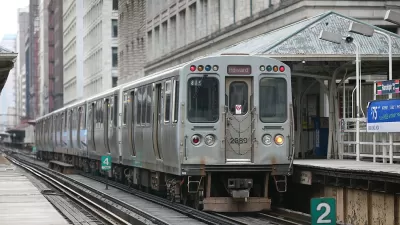While ride-hailing is on the horizon for the Canadian city, the experience so far without the mode provides useful insight into its effects on regional mobility.

Vancouver, British Columbia, does not have ride-hailing services, and David Zipper considers how this might have affected transportation trends in the area. Overall, the percentage of residents commuting by transit, walking, and cycling rose between 2013 and 2017, and carsharing is a popular transportation option.
Zipper also notes that ridership on TransLink, Vancouver’s regional transportation network, increased by almost 7 percent in 2018, which is significant as most U.S. transit systems saw ridership decreases.
Still, ride-hailing will likely be coming to Vancouver soon, with many residents supporting legislation that would legalize it. "FOMO may be playing a role; [Andrew] McCurran notes that many Vancouverites have tried ride-hailing elsewhere and don’t understand why they can’t use it at home," writes Zipper.
Vancouver policymakers are also looking at measures—such as a cap on the number of ride-hail vehicles and a per-ride tax—to alleviate the difficulties other cities have faced in integrating this mode into their larger transportation systems.
FULL STORY: What’s It Like Living in a City Without Uber or Lyft?

Maui's Vacation Rental Debate Turns Ugly
Verbal attacks, misinformation campaigns and fistfights plague a high-stakes debate to convert thousands of vacation rentals into long-term housing.

Planetizen Federal Action Tracker
A weekly monitor of how Trump’s orders and actions are impacting planners and planning in America.

In Urban Planning, AI Prompting Could be the New Design Thinking
Creativity has long been key to great urban design. What if we see AI as our new creative partner?

King County Supportive Housing Program Offers Hope for Unhoused Residents
The county is taking a ‘Housing First’ approach that prioritizes getting people into housing, then offering wraparound supportive services.

Researchers Use AI to Get Clearer Picture of US Housing
Analysts are using artificial intelligence to supercharge their research by allowing them to comb through data faster. Though these AI tools can be error prone, they save time and housing researchers are optimistic about the future.

Making Shared Micromobility More Inclusive
Cities and shared mobility system operators can do more to include people with disabilities in planning and operations, per a new report.
Urban Design for Planners 1: Software Tools
This six-course series explores essential urban design concepts using open source software and equips planners with the tools they need to participate fully in the urban design process.
Planning for Universal Design
Learn the tools for implementing Universal Design in planning regulations.
planning NEXT
Appalachian Highlands Housing Partners
Mpact (founded as Rail~Volution)
City of Camden Redevelopment Agency
City of Astoria
City of Portland
City of Laramie





























